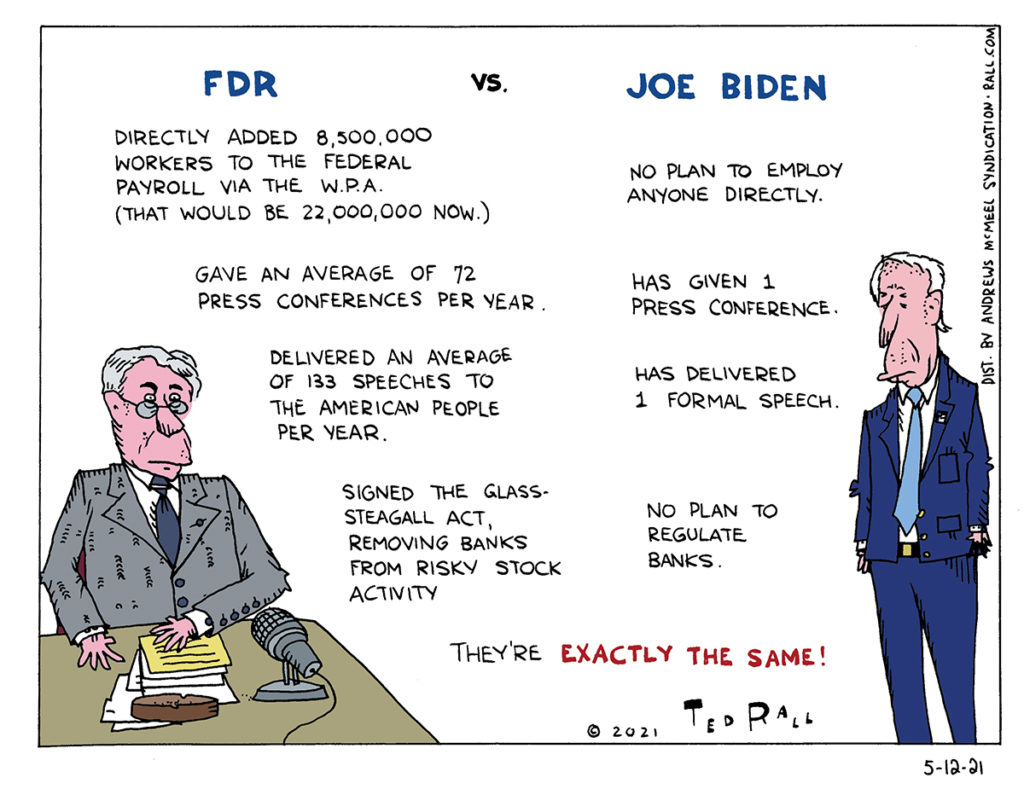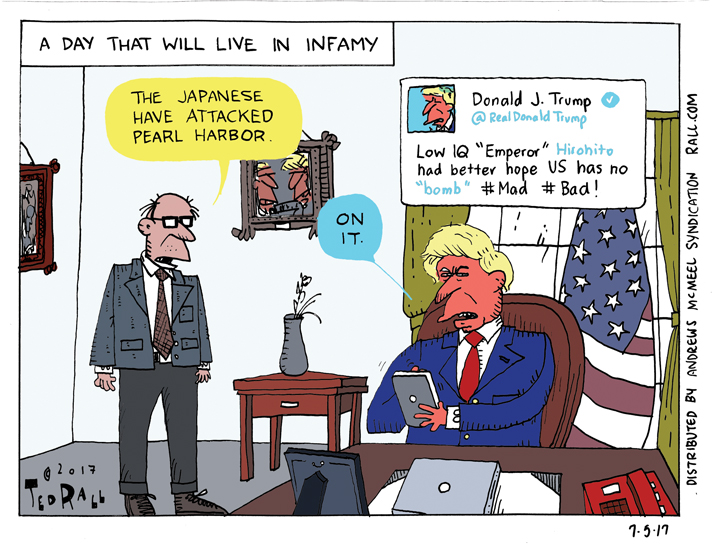
Bipartisanship is dead. But job-killing trade agreements like NAFTA were promoted by politicians of both major parties alike—until Donald Trump. “Our politicians have aggressively pursued a policy of globalization, moving our jobs, our wealth and our factories to Mexico and overseas. Globalization has made the financial elite, who donate to politicians, very, very wealthy. I used to be one of them,” he told an audience in Pennsylvania in 2016. “Many of these areas have never recovered and never will unless I become president. Then, they’re going to recover fast.”
They didn’t. The Rust Belt continues to disintegrate.
Trump didn’t deliver. But his message proved to be an effective vote generator. It turned Ohio, the ultimate bellwether swing state, red. Formerly Democratic Pennsylvania now swings. So it’s no surprise that Trump is repeating his message to workers: deindustrialization sucks, no one sees your pain but me, and I’ll make it go away.
This year, Dr. Trump is going even further than any previous Republican president has gone before, reaching out to big labor, long a bête noire for Republicans. September 27th finds the once-and-possibly-future president skipping the second GOP presidential debate and speaking instead to striking autoworkers.
Symbolically, Trump’s outreach represents a radical contrast for a party with a long and consistent history of antagonism to workers’ right to bargain collectively. Congressional Republicans rammed through the Taft-Hartley Act, Reagan fired the air traffic controllers, Republican-controlled legislators created union-gutting “right to work” states and, as a result, union campaign contributions overwhelmingly flowed to Democratic candidates. This is the first time in memory—possibly ever—that a major Republican presidential contender has thought of campaigning to union members, during a walkout no less.
Meanwhile “Union Joe” Biden, who likes to emphasize his working-class Scranton background and has collected numerous union endorsements, has been publicly silent about the UAW strike—a stance made starker when he jammed a contract down the throats of freight train workers when they threatened to walk off the job. The President hasn’t expressed any desire to meet with striking workers, whether at one of the big three automakers, the SAG-AFTRA writers in Hollywood, or Amazon warehouses. Biden’s support for unions has been performative and rhetorical.
What about Trump’s?
At this date, Trump is the better talker. Nothing new here, when compared to Biden. The question is, might the Republican Party assume policy positions that credibly allow it to argue that it has become an ally of workers, after decades of being their enemy in service of their corporate masters?
If anyone can and will spearhead such a pivot, it will be Trump, the man who pulled off the neat trick of running against the Iraq War in the den of bloodthirsty militarism that is a Republican primary, and winning, and going on to become the first president in two decades to seriously negotiate with the Taliban, signing a deal to withdraw from Afghanistan, yet remaining a hero of the right.
Should Trump construct a pro-labor Republicanism, we may be at the dawn of the biggest political realignment election since 1932. Roosevelt’s victory at the depth of the Great Depression and the subsequent enactment of his New Deal reversed the basic duopolistic structure in place since 1860. For three-quarters of a century the Party of Lincoln had represented progressivism and the struggle for equal rights while Democrats had embraced reactionary and racist policies with the occasional interruption of white-aligned populists like William Jennings Bryan; in rough terms, the parties switched places as Democrats embraced liberalism as we know it and Republicans took on conservatism.
We are currently experiencing a realignment-in-waiting, a 1932-scale ideological reversal that is taking hold in some arenas, tentative in others and will live or die depending on what party leaders do about two or three key issue categories.
On foreign policy, realignment is nearly complete. America’s current project in interventionism, the proxy war in Ukraine, enjoys full-throated support from Biden and Congressional Democrats while the antiwar voices are found not in the supposedly democratic-socialist “Squad” but the far-right Freedom Caucus. Culturally, the Democratic Party has become the home of well-educated coastal elites while the GOP increasingly draws in voters with high school educations and lower incomes in flyover country.
Realignment remains stillborn without an analogous reversal in domestic affairs, however. This is where Republicans have yet to demonstrate an appetite to reverse course.
A 180° switcheroo would see a genuine attempt by Republicans to address long-standing economic problems that traditionally have been Democratic Party projects if and when they have been discussed at all: soaring healthcare costs, high college tuition, poverty, homelessness, unaffordable housing, low real wages. In Alcoholics Anonymous the first step is admitting you have a problem; in politics the first step is talking about a problem in a way that shows that you acknowledge its existence. Some Republicans are finally starting to address some of these issues. But that’s a far cry from proposing meaningful solutions, much less legislation.
Trump’s hostile takeover of the Republican Party put him on a collision course with the neoconservatives who started two forever wars. He prevailed in that fight. Should Trump choose to chart a path for Republicans that includes an appeal to ordinary workers, he will have to defeat the traditional Republicans who created the status quo like rival presidential candidate Senator Tim Scott of South Carolina, who suggests that the appropriate response to striking auto workers is to replicate the way Reagan handled PATCO: “He said, you strike, you’re fired. Simple concept to me to the extent that we can use that once again.” Similarly, Governor Brian Kemp dismisses the UAW as a blue-state nuisance: “We just haven’t been dealing with it in Georgia, because we’re a right-to-work state.”
Trump’s outreach to labor could, and most likely will prove to be, nothing more than an empty gesture designed to extract votes ahead of an election, no follow up forthcoming, no actual leaning on management to cough up higher wages and better conditions for workers. Or it might be the beginning of something big, like his America First foreign policy, which overturns the balance of power inside his party and changes the way we think about what both major parties stand for.
(Ted Rall (Twitter: @tedrall), the political cartoonist, columnist and graphic novelist, co-hosts the left-vs-right DMZ America podcast with fellow cartoonist Scott Stantis. You can support Ted’s hard-hitting political cartoons and columns and see his work first by sponsoring his work on Patreon.)





 You’ve heard it so often that you may well believe it’s true: Trump’s second term would be a disaster. For the Democratic Party. For the United States. For democracy itself. “The reelection of Donald Trump,” warns Nancy Pelosi, “would do irreparable damage to the United States.”
You’ve heard it so often that you may well believe it’s true: Trump’s second term would be a disaster. For the Democratic Party. For the United States. For democracy itself. “The reelection of Donald Trump,” warns Nancy Pelosi, “would do irreparable damage to the United States.”
